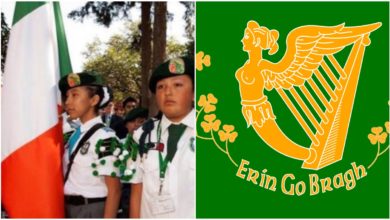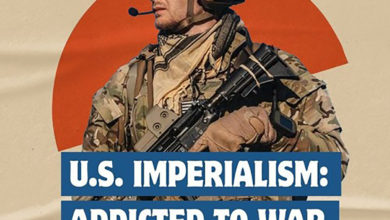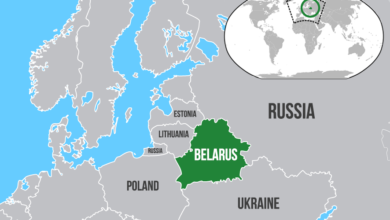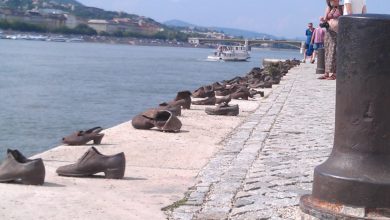On March 7, Irish revolutionary forces ambushed and killed two members of the occupying British army for the first time in 12 years. Two days later, an officer of the British-imposed police force in Northern Ireland was shot dead in his patrol car. The Real IRA and Continuity IRA claimed responsibility for the attacks, respectively.
Both these events have triggered a flurry of media activity, with countless British, Irish and American newspapers hailing what they characterize as a unified Irish rejection of violence.
Ruling-class and occupation forces within Ireland mobilized to paint the same picture. Catholic and Protestant clergy attacked the militant Republican movement. British officials proclaimed that the rebels have no support among the general populace. Sir Hugh Orde, head of the occupation police, even said opposition to British rule is limited to “three hundred people.”
These absurd comments reflect a long history of British imperialists’ denial of and propaganda against the nationalist movement. A wealthy English elite has ruled over Ireland since the 14th century. In those early days, resistance movements were characterized as violent extremists with no public support.
In 1921, the nationalists defeated the British army after a long guerrilla war, guaranteeing a new era of sovereignty for the Irish people. Utilizing bigotry and religious persecution, however, the British secured the aid of Northern Ireland’s Protestant population and maintained a tight grip over the region—a colonial rule that remains to this day.
During the long revolutionary war known as “The Troubles,” from the 1960s to the late 1990s, British police and soldiers colluded with extreme right-wing loyalist gangs to beat the Republican community into submission. By characterizing the conflict as a religious war rather than a struggle for independence, the British media secured international support and drove the Republican leadership to accept humiliating concessions.
Sinn Féin was in the leadership of the Republican struggle against British imperialism during the period of “The Troubles.” Since the peace agreement signed in 1998, Sinn Féin has opposed the use of revolutionary methods and instead supports the British police. In recent years, Sinn Féin endorsed the authority of the Police Service of Northern Ireland, a bigoted force comprised of 80 percent Protestant members that colludes with British imperialism.
In response to the recent attacks on occupation troops, Sinn Féin leader Gerry Adams added his voice to the ruling-class chorus, saying that the militants have “no support, no strategy to achieve a United Ireland.”
With the media, religious leadership and even the mainstream nationalist movement on the side of the British, it would appear that the rebels truly lack support from the Irish people. The facts suggest otherwise. Following the attacks on occupation forces, PSNI officers raided the homes of several prominent Republicans, detaining political activists on flimsy evidence and conducting police sweeps of nationalist areas. Police investigating the shootings came under attack from rioters in the town of Lurgan; groups of local citizens pelted the officers with bricks and Molotov cocktails, injuring at least one.
The response to the occupiers and police reflects the true opinion of the Northern Ireland populace. While British leaders may suggest they have total support, in reality, their police forces are deeply hated by working-class members of both Catholic and Protestant communities. Their tendency to raid nationalist communities and arrest members of progressive organizations only exacerbates this anger. These conditions under occupation are what ultimately cause attacks such as those seen this month.
Economic crisis sets the stage for further struggle
The repressive British presence in Northern Ireland serves the interests of a tiny social elite. A united working class in Ireland, for which Republicans strive, would be too strong for the British bourgeoisie to overcome. With the Irish economy in a rapid downward spiral even worse than that of the United States, the regional ruling class knows that they can only survive by dividing the people along religious and ethnic lines.
The effects of capitalism in Ireland, especially the variety imposed by the British, have become painfully clear in recent months. A booming economy known as the “Celtic Tiger” formed in the 1990s, fueled by low corporate taxes and an influx of high-tech American businesses. This economic growth led to a massive construction industry and a “housing bubble” similar to that of America.
Since this bubble burst in 2008, thousands of jobs have been lost and banks have collapsed across Ireland. The government, hoping to keep corporations afloat, bought out the massive Anglo Irish Bank and passed the expense on to workers.
The Irish government’s handling of the economic crisis led to a protest march of 150,000 Dublin workers in February, and since then opposition to exploitative government policy has only increased. While workers in the Republic of Ireland continue to bear the brunt of the banks’ crisis, those in the North suffer even more.
The Irish people face a collapsing economy and imperialist economic and political domination. With mounting public opposition to the rule of banks and corporations, it is no wonder that British occupation troops have stepped up their campaign to divide the Northern populous and isolate remaining Republican opposition. The road to a lasting peace is for all foreign military forces to leave Ireland, once and for all. That is the road toward genuine self-determination.





